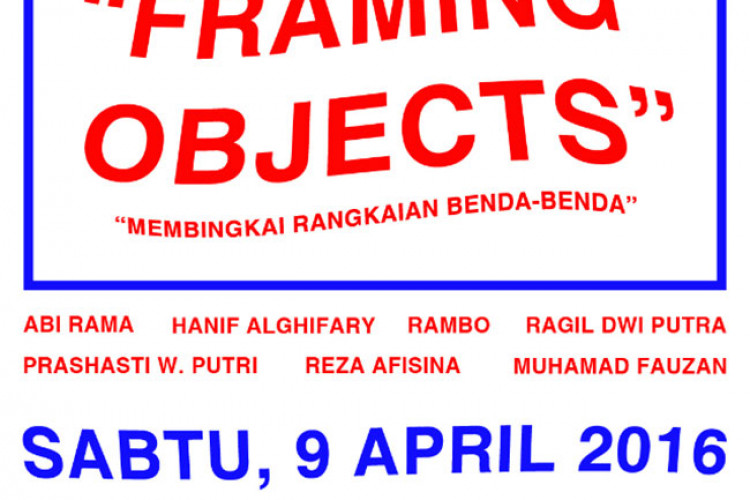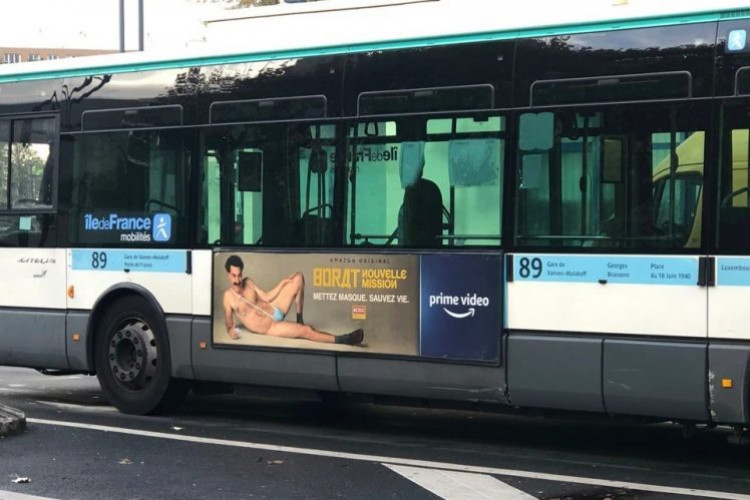Composing Music with Aghi Narottama
Muhammad Hilmi (H) talks to music composer Aghi Narottama (A).
by Ken Jenie
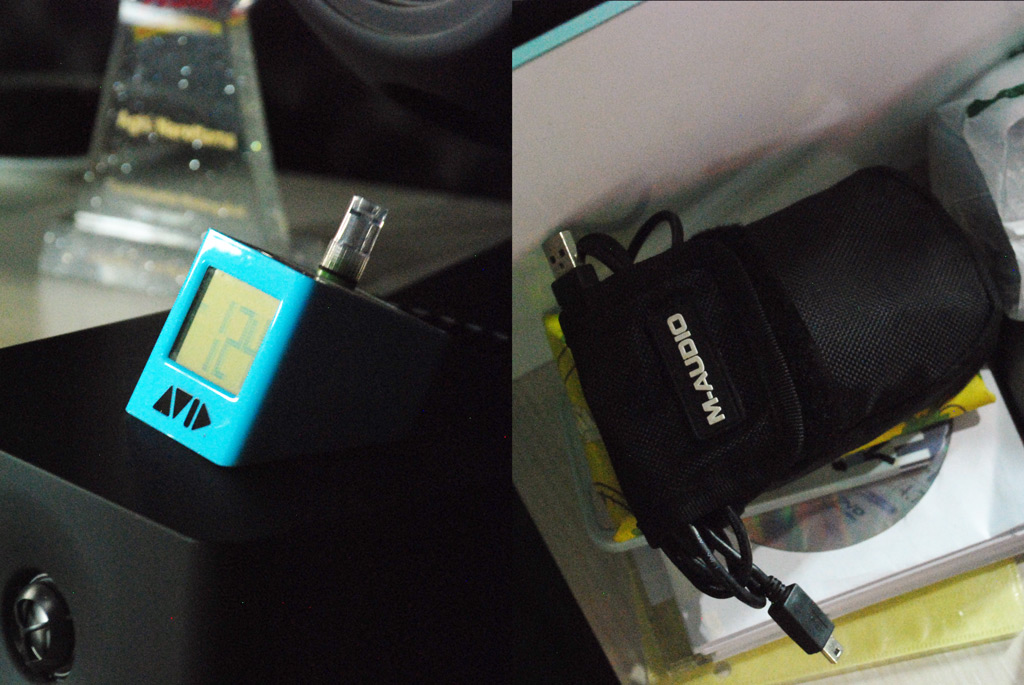
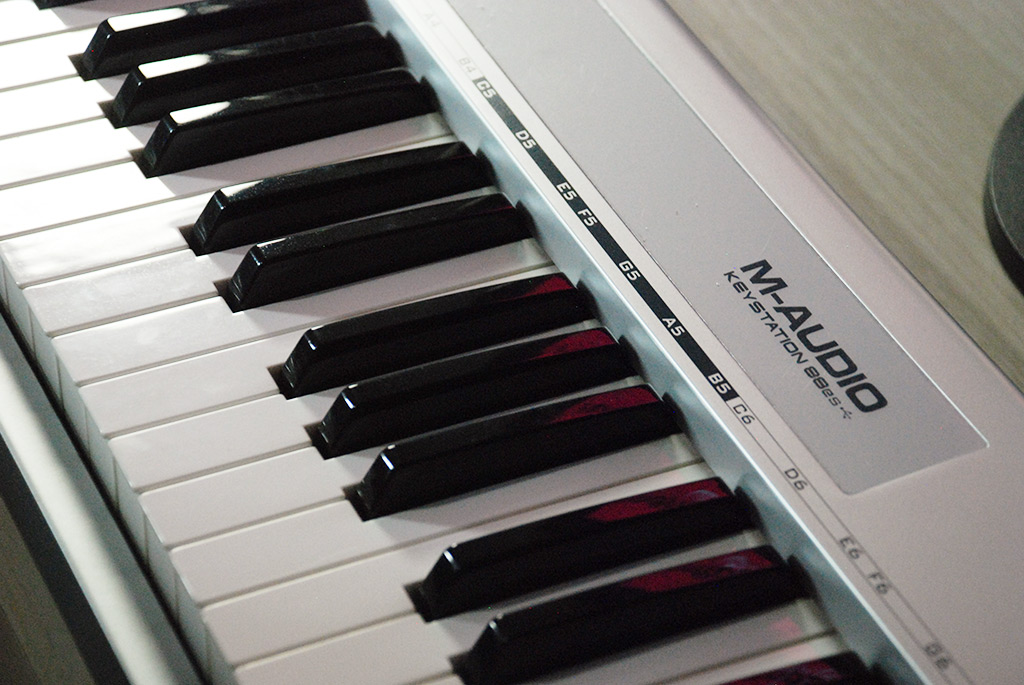
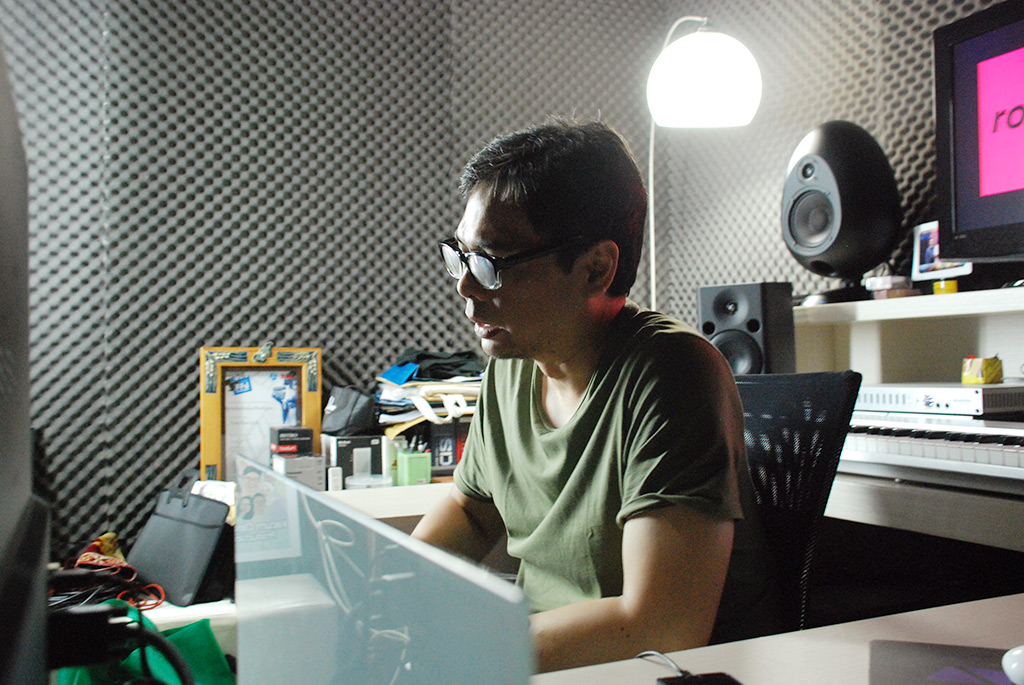
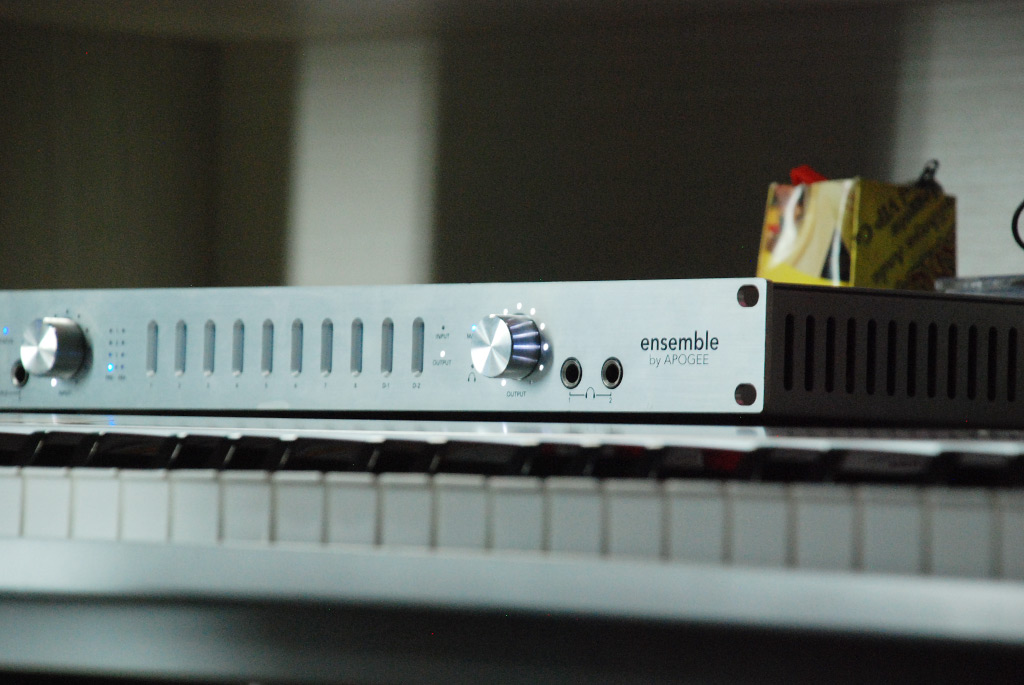
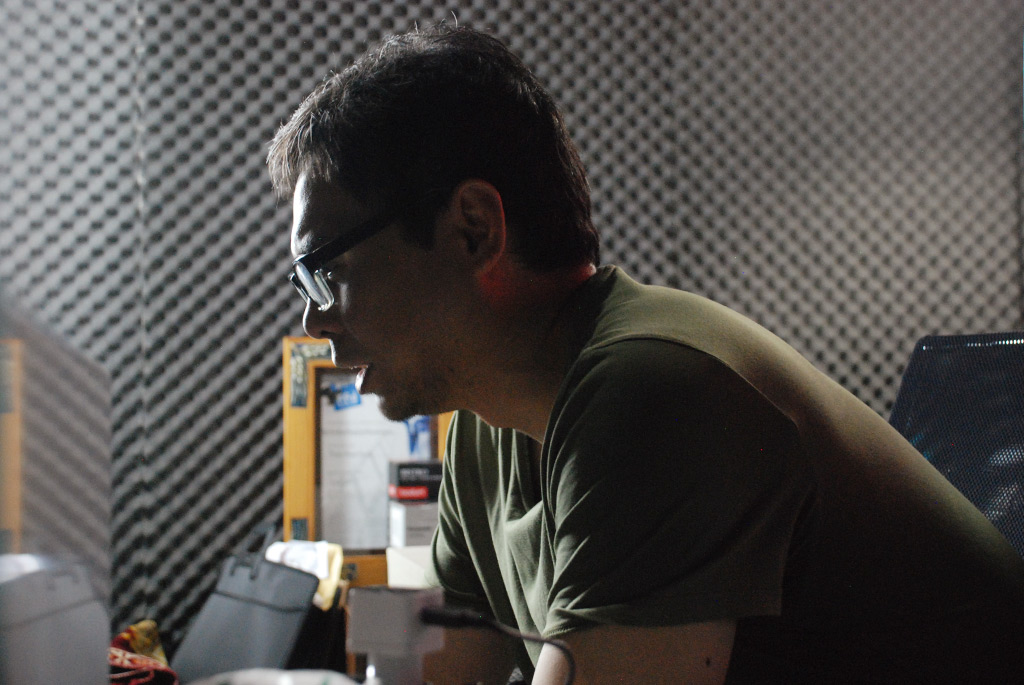
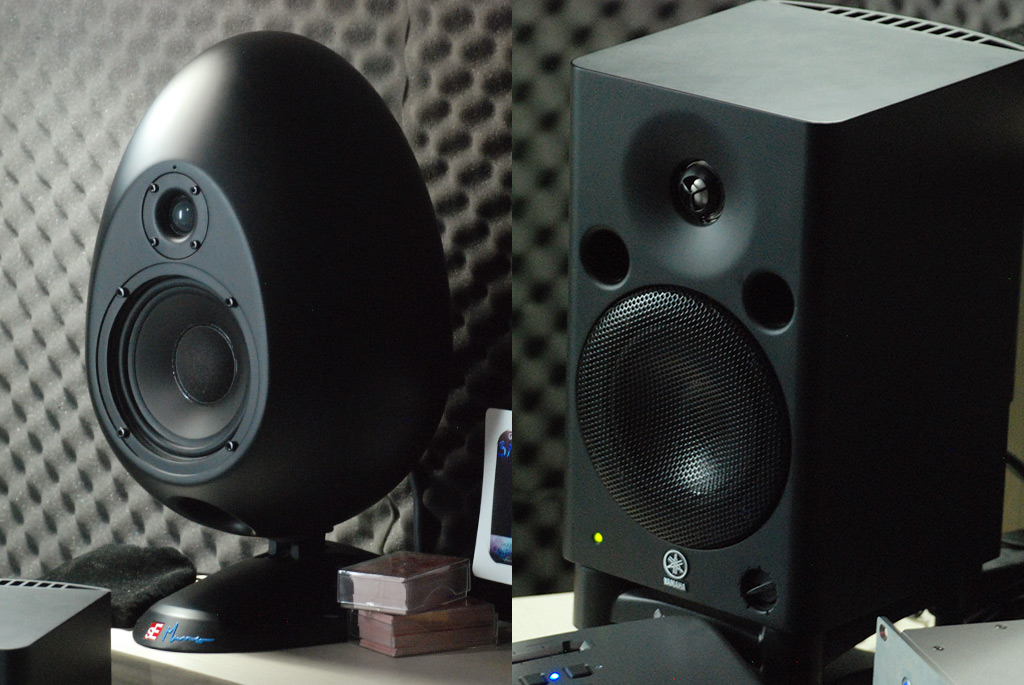
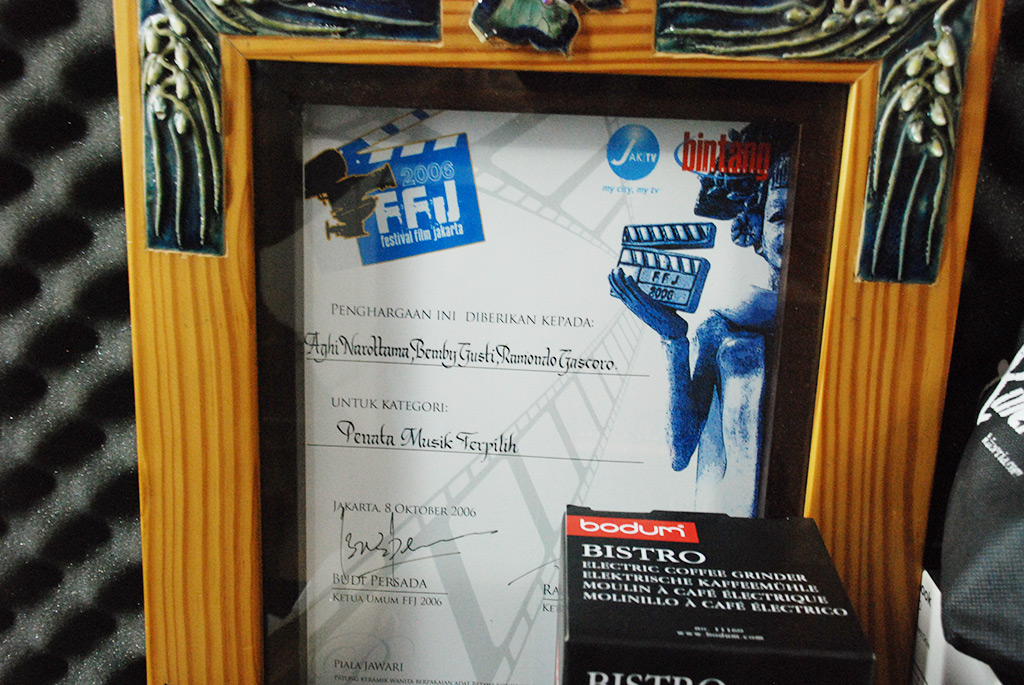
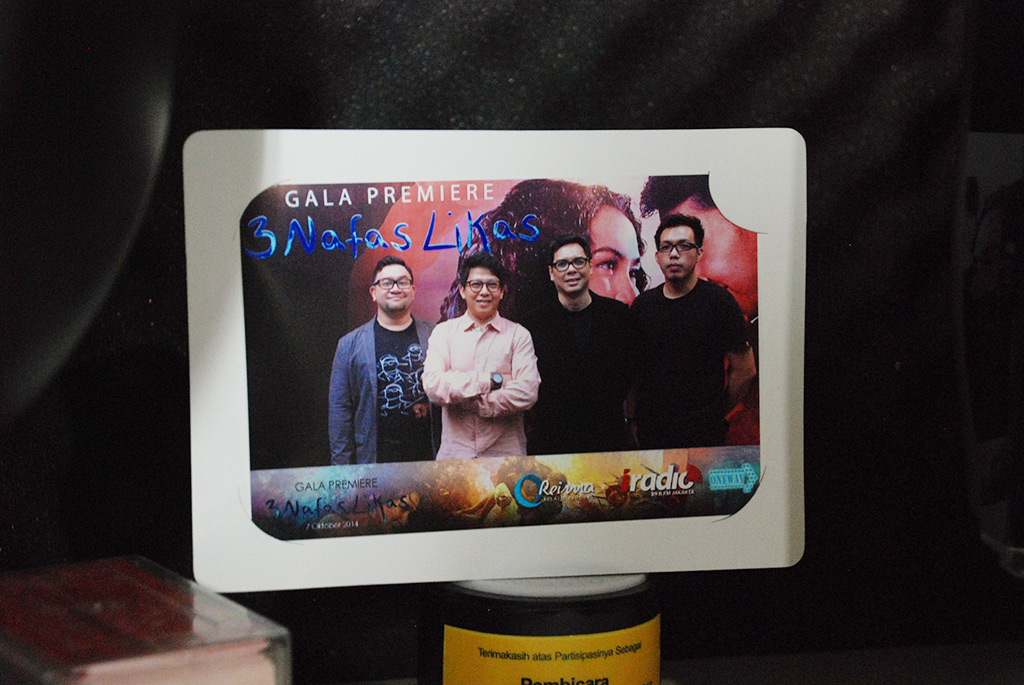
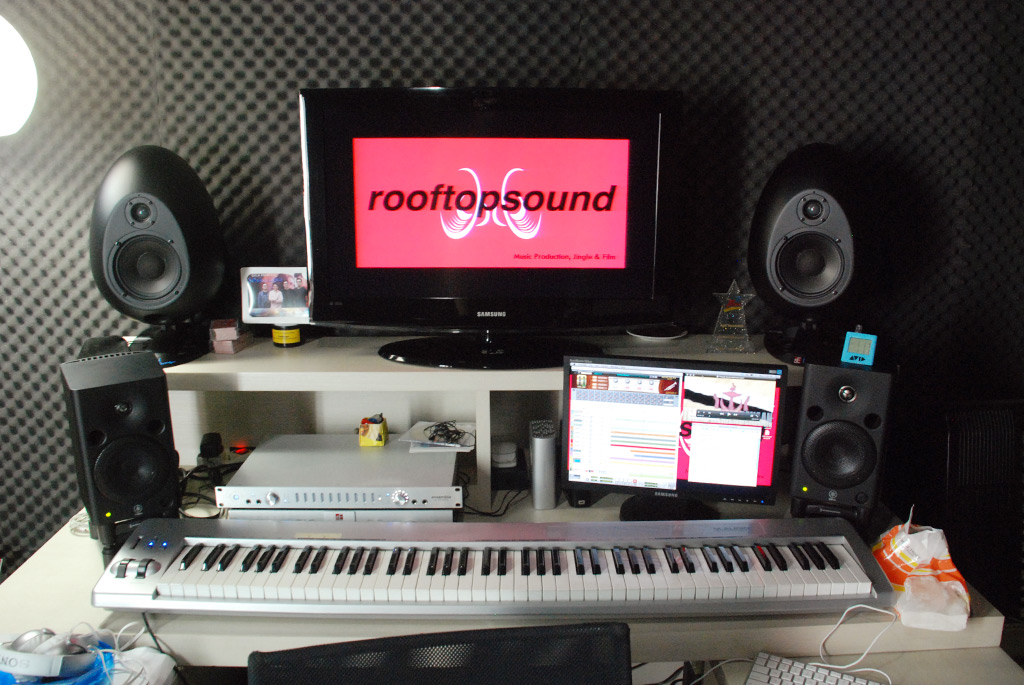
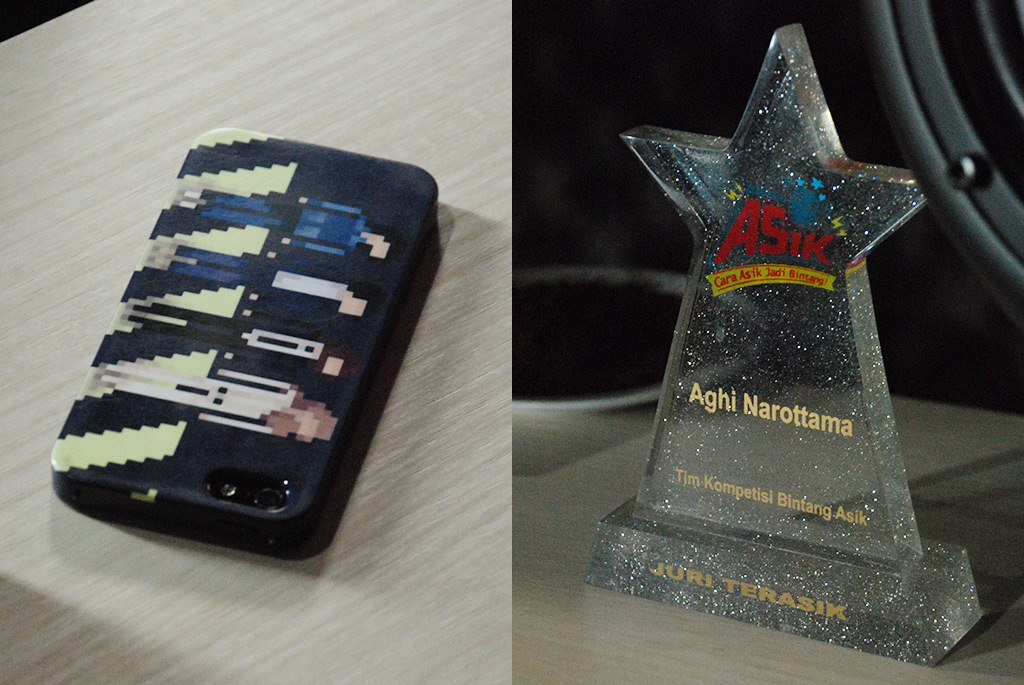
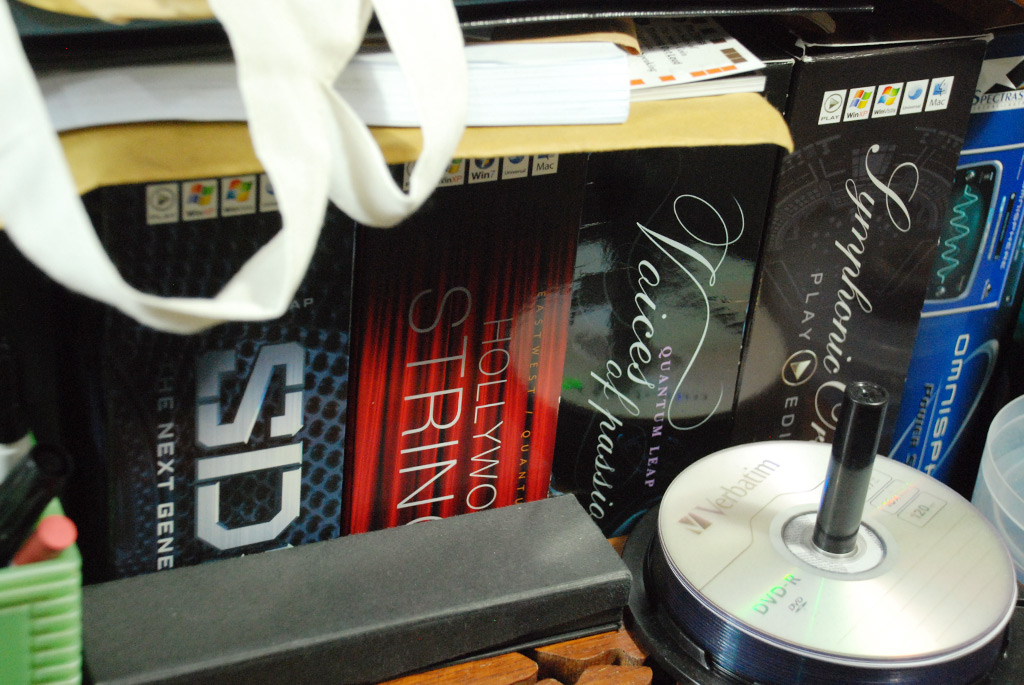

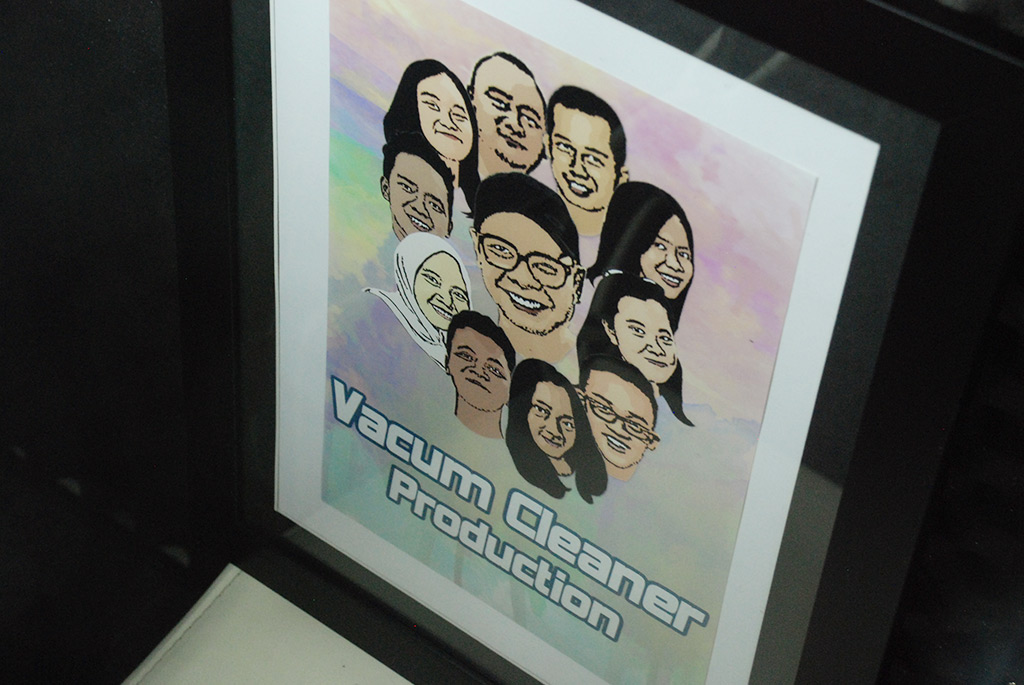
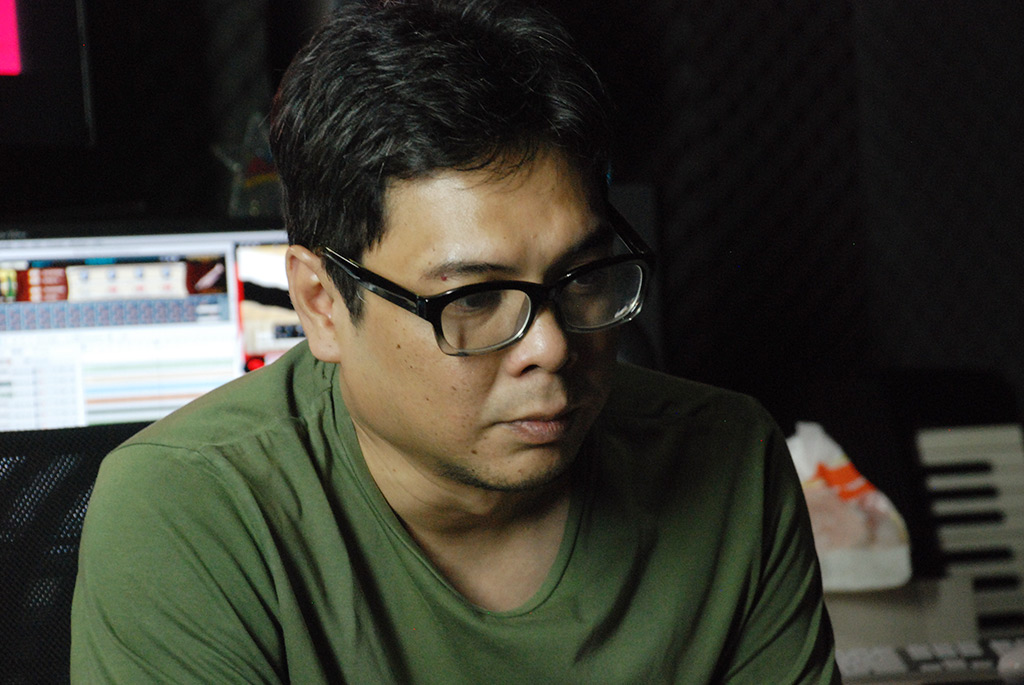

H
What movies made you interested in movie scoring?
A
It started when I watched Stephen Speilberg’s “The Goonies” when I was 8 or 9 years old. Its opening score amazed me, and because of that movie I began to pay more attention to music in films. I then began not only to pay attention to the music but also to the people who made them. The funny thing is the opening theme song was made by Dave Grusin, a jazz musician, while the rest of the score was made by John Williams. The film, particularly Dave Grusin’s contribution, revealed to me that scoring doesn’t have to be done by a great orchestral conductor.
I then began do some research about film scoring, the people behind it, and the people behind the movie. I also began collecting film scores, even though it was diffiicult to do back then. Back then it was just a hobby, I was just a fan, because during the 80’s or 90’s, our Indonesian movie industry was “dead”. Once i graduated from university, I studied audio production in Seattle, I didnt study music scoring specifically but it helped my understanding a lot.
My music career began in a band. I learned how to play guitar with friends. There were no signs of me becoming a musician or movie scorer or making music for film. But still, as a music movie fan, my love for film grew each day. I admired people who made music for films, I really enjoyed watching movies and as I watched I learned which kind of music was good for which kind of scenes. from there I learned about audio production and recording techniques – It was more technical things. I myself never studied about music, never went to music school. What I studied was more like about the audio.
H
Was it the reason why in Janji Joni, your contribution was more of a song than a score?
A
I wasn’t the music director in Janji Joni, it was Age Erlangga, though people often think it was me. In Janji Joni I contributed more through my band, Ape on the Roof, Bembi Gusti, and Sore. The scoring was done by Age. But after that I was introduced to Janji Joni’s producer, Nia Dinata, and for the next film, Berbagi Suami, we were asked to contribute.
H
So your first score was in Berbagi Suami.
A
Mondo Gascaro, Bembi Gusti, and myself were asked by Nia Dinata. It was a brave decision because at the time I had no experience at all. The good thing was that we were on the same page as Nia Dinata. We had the same taste of music. We watched Berbagi Suami without music and we could already think of which music goes to with which scene. So although we were nervous, it wasn’t difficult. We were also given a proper time-frame to do our work so we had time to explore and do some research.
H
What is your approach when you do scoring, are there templates for scenes and such?
A
Not really. Music scoring is tailor made, so we make new and fresh ideas every time. Eventhough for example, there are “templates” of what scary music sounds like etc, but the “template” is just a basic. A more advanced scoring has three steps: First, how to make a music that fits the pictures. Second, how to make a music that fits the scene but is especially made for the story. Third, how to make a music that fits the scene and is especially made for the story, but from my point of view of the music maker. It will never be the same in every movie. We have to talk to the director a lot. It is possible that, for example, we are asked to create music for a scary scene but it turns out the result doesn’t sound that scary. That is why we have to communicate with the director. It’s not that easy.
H
How do you see scoring in Indonesia?
A
Scoring is different for films and television. People watch movies in theaters out of their own will. They pay the 30.000 rupiah admissions fee and they spend the next two hours sitting there. This means that we have an opportunity to show them how our music can spark imagination, not only guide the scene. Television viewers come and go. Viewers don’t spend two hours in front of a TV, that is why music in television has to be more attention-grabbing so people will pay attention. It has to have the power to grab your attention.
Movies are more ideal because we can use our imagination. When it comes to TV, we have to make people willing to stay on the program, that is why music in soap operas are so dramatic – so somebody who is ironing will stop and watch the television.
H
How about the jingles in TV commercials?
A
Jingles more like “what do you want and I’ll make that for you” jobs. Yet it is still important to sit together with the director and the producer to talk about where they want to bring this product, who is their target audience, and who they want to buy the product. The selling part still is the most important, especially television commercials. We have to make people stop while our commercial is playing on TV. From the artistic point of view, we want to make every commercial different from one another, so it won’t be too mainstream.
H
Are you still working at Institut Musik Indonesia? If so, what is your current position?
A
Yes, I am serving as the head of the music and audio production department. But this will be my last semester. The next semester I will be the advisor of big agendas, so what I take care of will be more like “where we would like to bring this school?” and “what kind of career the kids will have after they graduate?”
H
What are the visions and missions of the school? Is it to build a structure for studying audio in Indonesia?
A
Yes. That’s why I went to the US to study about audio, because we had no such schools in Indonesia. I learned a lot from there, even when I did not have a prior education in music. What my experience meant was that people can still study audio engineering without having studied music formally – I wanted to learn and I did.
That’s our vision and mission, to open peoples eyes and see that music isn’t all about being in a band and learning instrument – there are commercial, radio, TV, film – even airplanes need an audio department. Now there are quite a lot schools like us yet its still not enough because there are so many people interested in learning.
H
Now in indoneisa the audio industry is developing
A
Yes, but we still have a lot of catching up to do. Our school does a lot of socializing, especially with the parents. Many parents think that studying audio engineering means that you will end up working simply as a studio engineer. If we look at the global music industry, it is worth trillions, and we as Indonesians can be part of that. As long as creative people are stimulated and motivated, as well as have the facilities and education. Indonesians are very creative and we love music – everywhere you go there are people playing the guitar, why not take it seriously?
H
You have now done many soundtracks, are there any particular ones that stands out in your opinion?
A
There are many, but the most obvious is Berbagi Suami because it was our first, so it was a valuable experience.
The second one would be Joko Anwar’s Pintu Terlarang. Joko always gives a challenge. In Pintu Terlarang we were asked to create an atmosphere that is very dark yet beautiful, so making the score was quite a rewarding challenge.
The third is from Brunei, not Indonesia. This project taught us how to collaborate, in this case with people from different countries. We usually work with our friends, and in this project we were working with people we have never met, from different countries and backgrounds. It turned out that films have a universal language. It was a chance for us to explore the world of film scoring.
H
Earlier, you said that in Indonesia, we still have a lot of catching up to do. Do you mean in terms of understanding scoring or a lack of technology?
A
I believe that in the technology department we are okay – it isn’t too difficult to get access to music and musical instruments/technology. What is lacking is the opportunity. People always ask why our albums aren’t released globally. Today’s music distribution is much easier – there is iTunes, Amazon.com. “Going International” doesn’t exist anymore as everything you release is, by default, international now. We also need support from different institutions, especially the government. The government here tends to make things difficult. For example, when we would like to do a concert, there aren’t buildings we can do them in, they would rather build malls. Meanwhile, that’s the support we need as creative people.
That, of course, is something we must advocate. With the new government, we hope they will fulfill their promise to develop the creative industry, that we won’t face questionable difficulties trying to be creative – create an environment where we can be comfortable to create.
H
You have also done mixing for many bands in the past, do you still do that now?
A
Not a lot, I do very little of it. When learning audio we are taught to mix, master, and record, this work is refreshing when I get tired of my daily work, so when somebody asks me to do some mixing I do it.
H
It’s sort of like getting back to your roots?
A
It’s fun to make somebody’s music sound good.
H
With Malam Terindah, you did a live score while the film was running. Was the purpose of this to share the spotlight with the people behind the scenes?
A
Live movie scoring isn’t a new thing, as a matter of fact, the first movie scores were live – music and film were separate back then. It was an interesting experience. The project was initiated due to the lack of interest in watching Indonesian films. Many people began looking for ways to make local films more interesting. We cannot compete with blockbuster films such as Transformers, Happy Potter, and Lord of the Rings. Indonesia makes great films, but it doesn’t attract viewers in droves, so we created gimmicks such as this live movie scoring. With the help of audio knowledge it isn’t too difficult. Live music scoring is interesting because the viewers can experience the film and the music live.
H
The film is packaged in a new way.
A
I hope it will continue because the response for Malam Terindah as very good. All films should receive such acclaims, so the audience will want to watch our films.
H
What are the problems you face as a composer?
A
There are many, but the one that is most difficult is time management. Filmmakers compete to get their films released as soon as possible, so we usually get very little time to create a score for it. I suppose many don’t realize that such a short amount of time affects the quality. We want the movie to be good, and like anybody else part of its production, we want our best quality to be featured because a film is eternal – we watch Star Wars in the 70s exactly the same way as we do now. If we were given proper time we can explore more and make the movie better. Unfortunately, most movies do not give us that proper time-frame, we are only given one or two weeks. Money isn’t the problem because we can make something simple with a small budget, as long as there is good treatment that adds value to the movie.
H
Any plans on returning to playing music?
A
Yes, there is a desire for that. Ape on the Roof is preparing new material, but we cannot say that it is a serious project, especially because releasing a CD isn’t going to be that big of a deal. I do want to work on music, but it isn’t my priority. My priorities are still the projects that helps me survive – my daily work such as commercials and movies. I create new music materials in my spare time for fun.
H
What can we look forward to from you in the upcoming year?
A
I have new film projects – Richard Oh’s Melancholy is a Movement, Indra Birowo’s Bunga Terkahir-the title is still tentative, a film about war, Kaskus, and Joko Anwar’s film that just finished shooting.
H
Any final words you would like to share with our readers?
A
Many people ask how they can enter the music scoring industry. My advice is to start from the bottom, as in work on your friends films, wedding videos, do it for fun. That’s how I started working with Joko Anwar – I first knew him as a journalist, not a filmmaker. Because of our friendship, our talks about music and films, I was trusted by him to creat music for his films.
So when you are just starting, don’t think about big movies by big directors, start with your friends – one of them will surely become a filmmaker in the future.
—








